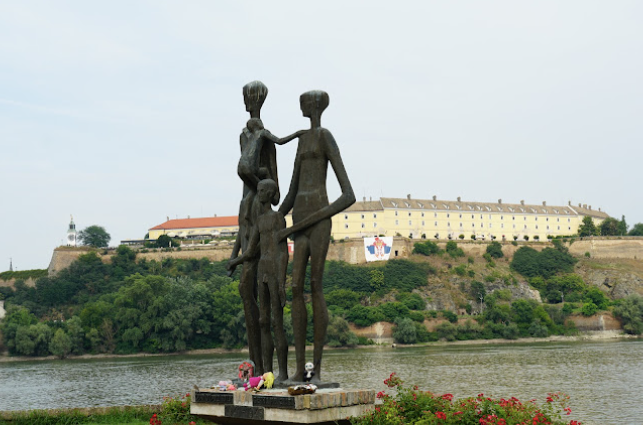“What is this life if, full of care,
We have no time to stand and stare.”
W. H. Davies
A couple of years after relocating from London to Doha, I found myself struggling with my first existential crisis.
In London, my life had been hectic—managing a full-time teaching job while raising two young children. Every minute of every day was accounted for. There were no pauses.
Life in Doha, on the other hand, was anything but hectic. It was quiet. I had quit my job. My children had turned teenagers. They started keeping their bedroom doors shut for longer. I had more time on my hands than I had bargained for.
At first, I enjoyed this new found freedom. To be able to graze in never-ending pastures of time was a luxury I thought I’d get used to.
But I didn’t. I couldn’t.
Something was missing. My initial euphoria of living an expat’s life dissipated by the time the second summer arrived in Doha.
I couldn’t bear the prison of sweltering summers of the Gulf. With temperatures soaring up to fifty degrees Celsius and humidity as high as seventy percent, there was no way I could step outside to dig up my happiness, ground my inexplicable grief and renew myself. I wasn’t happy.
We held a family meeting. My husband was enjoying his new job. So, going back to London wasn’t an option, not yet anyways.
“Why don’t you start writing Ma?” my daughter asked. “You always complained you didn’t have enough time in London. Now you do.”
“Start a blog.” My son offered.
How? I wondered.
“You’ll figure it out. It’s easy.” They both dismissed my misgivings about technology.
“Really, Ma. It’s easy.” They stated.
It wasn’t. But I persevered.
In August of 2013, I started my blog and called it, My Ordinary Moments. The tag line read, a journey of self- discovery.
“The cave you fear to enter holds the treasure you seek.” Joseph Campbell’s words have often rescued me from my deepest darkness.
The discipline of planning a post, of writing and of sharing my thoughts started unfurling me to myself, one post at a time. The quiet, peaceful pace of Doha gave me permission to sit with my cup of chai every morning to watch the mynah and the bulbul dance and chatter on our adolescent neem and mulberry trees. I’d sit and stare for hours— sometimes emptying myself and sometimes filling my crevices with simple, everyday joys and when it was time, I’d get back to my desk and write. Just like Campbells’ cave, ‘My Ordinary Moments,’ pulled
me out of my crisis.
Davies’s ‘Leisure’, a poem I’d read a long time ago in school, became my anthem. I even wrote a tribute to it on my blog. But it was ten years later, on arecent trip to Novi Sad, Serbia’s second largest city, that I truly absorbed the meaning of Davies’s poem.
JUNE 2023
My husband and I had clocked an impressive seventeen kilometres of walking by the time we paid (less than a euro each) to enter the beach at the Strand. The Strand had come highly recommended. It’s Novi Sad’s 700 meters long city beach on the Danube.
We looked for a bench in the shade to sit. But the Danube was too tempting. I took my shoes and socks off and walked over grass and sand to dip my toes. The water felt cool and refreshing.
“Bravo!” I heard a man’s voice. Then a splash. “Bravo!” he repeated.
Another splash.
I turned to look.
The man was holding a boy, his son I assumed, horizontally in his arms, like a baby – as high as his chest. Serbians are tall. He was too. Tall and broad and very brown. He lifted his arms higher and let go of his load.
His son, perhaps seven or eight years old, swam confidently underwater and resurfaced a couple of feet away, behind him.
It was the man’s little girl’s turn now. She looked about three years old. He held her just like he’d held his son, securely in his arms. I noticed he’d started moving closer to the shore, to the shallow end, very, very slowly while talking to both his children and then gently lowered his arms to his knees, lifted his daughter a couple of inches above the water, then slowly lowered her. The water caressed the little girl’s bottom. She squealed with delight. He let go. She dunked under and resurfaced immediately. Bravo! Bravo! The man cheered loudly. He was beaming. She was beaming. Her grandmother was cheering from the shore—a few feet away.
It was the son’s turn again. Like before, the man scooped his son up high and took large strides away from the shore, hitched him higher and let go. Bravo!
His voice boomed and rippled with the waves of the Danube.
Differentiated lesson plans. I was reminded of my teaching days. A little tweak, a tender consideration, lots of encouragement and children of all aptitudes and abilities can access the same lesson, the same activity with the same amount of a sense of achievement.
Now, the son lifted his younger sister, copying his father. He lifted her as high as he possibly could and chucked her into the water with a noisy splash. Brothers! The little girl resurfaced, resplendent with pride. Transfixed by the moment, in my spot of grey, fine sand, I started laughing with the family. The Danube kept sending wave after wave of cool, cool water to soothe my tired legs.
Before long, the family went running to the shore to get dried up or to get ice-
cream.
Before long, the family went running back to the shore to get dried up or perhaps to get ice cream.
My husband and I returned to our bench, dried our sandy toes on the scrubby grass and watched time go by on the Strand, a slice of Serbia so perfectly matched to Davis’s lines that I wondered if a scene similar to this one had inspired him to write the poem.
The beauty of just sitting and staring at the Strand, the beach, the people, the boats and the water filled me up. Satiated. The tapestry of life is the stitching together of ordinary moments such as these. A pause is a good thing. It lets us appreciate how far we’ve come on this journey of self-discovery.
My husband and I didn’t talk. There was no need. Our shared silence held us together like a blanket. It felt good; this feeling of home, of uncomplicated leisure, of surrendering to the magic of an ordinary moment.

